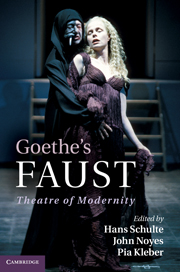Book contents
- Frontmatter
- Contents
- List of illustrations
- List of contributors
- Preface
- List of abbreviations
- Introduction
- PART I MODERNITY
- PART II THEATRE
- 13 Goethe's Faust: theatre, meta-theatre, tragedy
- 14 Faust beyond tragedy: hidden comedy, covert opera
- 15 Theatricality and experiment: identity in Faust
- 16 Rhetorical action: Faust between rhetoric, poetics and music
- 17 Directing Faust: an interview
- 18 A contradictory whole: Peter Stein stages Faust
- 19 Re-thinking and staging Goethe's Faust at the State Theatre Stuttgart 2005–6
- 20 Strehler's Faust in performance
- Select bibliography
- Index
- References
14 - Faust beyond tragedy: hidden comedy, covert opera
Published online by Cambridge University Press: 01 June 2011
- Frontmatter
- Contents
- List of illustrations
- List of contributors
- Preface
- List of abbreviations
- Introduction
- PART I MODERNITY
- PART II THEATRE
- 13 Goethe's Faust: theatre, meta-theatre, tragedy
- 14 Faust beyond tragedy: hidden comedy, covert opera
- 15 Theatricality and experiment: identity in Faust
- 16 Rhetorical action: Faust between rhetoric, poetics and music
- 17 Directing Faust: an interview
- 18 A contradictory whole: Peter Stein stages Faust
- 19 Re-thinking and staging Goethe's Faust at the State Theatre Stuttgart 2005–6
- 20 Strehler's Faust in performance
- Select bibliography
- Index
- References
Summary
PART ONE
Goethe called Faust a tragedy. Of course, its protagonist is nothing less than tragic. Regardless of whether our reference point is Aristotle's conception of tragedy, or the modern, post-Schelling, metaphysical one, Faust lacks the fundamental criterion of the tragic – suffering. He thus never evokes the sympathy of the viewer or the reader. Why is that? In the thirteenth chapter of his Poetics, Aristotle described ‘similarity’ between the hero and the viewer as one of the conditions of the tragic effect, for it alone enables the viewer to identify with the protagonist. Fear and pity are identificatory affects. Now, Faust – the Übermensch who is constantly trying to surpass the conditio humana (490) – is at no point ‘similar’. He raises himself above every limiting, conditioning human form and thus permits no identification which might be bound to this form. One who, in Mephisto's words, ‘overleaps the joys that this world affords’ (1859), also bypasses its suffering.
In moments of impending failure, when ‘all mankind's miseries’ (4406) take hold of him, Faust always manages to evade the tragic consequences of his actions by discarding his earthly form and taking on another. He flees from science and from the collapse of the edifice of knowledge he has erected, taking recourse first in white and – after ‘memory’ (781) has preserved him from suicidal oblivion and returned him to the limiting realm of ‘earth’ (784) – later in black magic.
- Type
- Chapter
- Information
- Goethe's FaustTheatre of Modernity, pp. 209 - 234Publisher: Cambridge University PressPrint publication year: 2011



